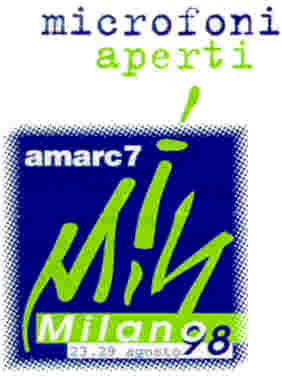amarc-1
[Date Prev][Date Next][Thread Prev][Thread Next][Date Index][Thread Index]
<amarc-1> Various thoughts
To Lyn:
Thank you for your lovely encouraging words. I suppose when I wrote
about my uncertainties I was in a somewhat pessimistic mood. If I were
a pessimist I would not be participating in this Forum I suppose. Its
just that I am a veteran and badly mauled survivor of the front lines of
the NOMIC Wars and when it gets rainy sometimes the wounds still hurt.
There is no doubt however that we must keep on fighting each in his or
her own way and with a clear belief that someday we'll be able to make
communication a real instrument for development. One of the vary
valuable things about this Forum is precisely to let us know that we are
more than we at times suspect and that it is perhaps possible to make a
difference. :-)
To Laine:
Your plight is one of the major difficulties we face as we divide more
and more into communication "have and have nots" and try to resolve
those differences. I agree with you and Lumko that some statement must
be made about children and media but another must also be made about the
ever growing dependence bewtween communication-powerful nations and
those of the Third World (and many in the First and Second worlds as
well as regards the imbalance in both infrastructure and contents.
To all:
Son I hope to address the questions posed by Elvira regarding strand 3
but they are as tough as they come. A couple of things come to mind for
the moment. First) Beware of NGOs. Not all of them are what they claim
and most end up responding at one time or another (knowingly or not) to
the interests and wishes of their patrons and benefactors, who also
happen to be based in rich countries and part of their cultures. As I've
written somewhere in all too many cases development communication has
turned out to be a "well meaning?" excercise where poor countries end up
pauying for solutions to problems that concern the funding entities and
using the solutions those entities impose under the guise of "fiscal
responsibility", "expertise" or "know how". Evidently and luckily this
is not always the case but we should not asume that non-governmental is
always good just as we should not take for granted in this age of
privatisations and neo-liberalism that government is always the enemy.
In fact I believe that one thing this Forum should do is to attempt to
rescue our voices, as individuals, as organisations and as nations in
the United Nations and its system (Unesco, ITU, etc.) They should be for
us important Fora for discussion of communication topics, approval of
international instruments of various sorts and even funding when
necessary but such funding has to be "sanitized" in the sense of
separating it from the not always healthy interests of the donors and
more objective and even sympathetic to the needs and priorities of the
recipients. We should look carefully at what the European Union is doing
to protect its communications and see how we can adapt their experience
and even find ways of joining them in strategic alliances. At the same
time we should look for ways of becoming more proactive (for or against)
in cases such as Microsoft vs. the US. Whatever happens there is bound
to affect all of us one way or the other and I still have not heard
"critical" voices analyzing what is to my mind a very complex and very
important case. Is it just a matter of monopoly by Gates or are there
other interests involved?. Will we, as almost totally dependent
Microsoft users be helped or harm by the decisions taken? Since we are
talking about a global situation shouldnt we ask that the ITU or the
International Court or Unesco or the UN General Assembly look into the
matter. What about the growing process of synergisation? Is there any
way to control Disney, Time-Warner, Murdoch, et.al? Or will they end up
controlling us? How can this be done while still respecting democratic
procedures and the right to communicate?. Beyond Declarations (which are
always useful) how can we defend community radio from the powers that
be? Rafael mentioned the Uruguay case and perhaps he should enlighten us
more on the subject. I could just be an interesting test case.
Cheers to all :-)
Jose Antonio Mayobre
++++++++++++++++++++++++++++++++++
AMARC 7 Foro Virtual Forum Virtuel
http://www.amarc.org/amarc7
to unsubscribe / pour se desabonner / para abandonar :
e-mail "unsubscribe amarc-1 " to: [email protected]
Tecnical realisation, scripting and archiving: Worldcom
Foundation
English: [Virtual
Forum Index] [Search
Forum archives]
Français: [Index
du Forum Virtuel] [Chercher
dans les archives du Forum]
Español: [Índice
del Foro Virtual] [Buscar
en los archivos del Foro]
